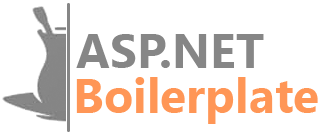In this document
ASP.NET Boilerplate can work with any O/RM framework. It has built-in integration with NHibernate. This document will explain how to use NHibernate with ASP.NET Boilerplate. It's assumed that you're already familar with NHibernate at some basic level.
NuGet package
The NuGet package to use NHibernate as an O/RM in ASP.NET Boilerplate is Abp.NHibernate. You need to add it to your application. It's better to implement NHibernate in a separated assembly (dll) in your application and depend on that package from this assembly.
Configuration
To start using NHibernate, you must configure it in the PreInitialize method of your module.
[DependsOn(typeof(AbpNHibernateModule))]
public class SimpleTaskSystemDataModule : AbpModule
{
public override void PreInitialize()
{
var connStr = ConfigurationManager.ConnectionStrings["Default"].ConnectionString;
Configuration.Modules.AbpNHibernate().FluentConfiguration
.Database(MsSqlConfiguration.MsSql2008.ConnectionString(connStr))
.Mappings(m => m.FluentMappings.AddFromAssembly(Assembly.GetExecutingAssembly()));
}
public override void Initialize()
{
IocManager.RegisterAssemblyByConvention(Assembly.GetExecutingAssembly());
}
}
The AbpNHibernateModule module provides basic functionality and adapters to make NHibernate work with ASP.NET Boilerplate.
Entity mapping
In this sample configuration above, we have fluently mapped using all the mapping classes in the current assembly. An example mapping class can be as follows:
public class TaskMap : EntityMap<Task>
{
public TaskMap()
: base("TeTasks")
{
References(x => x.AssignedUser).Column("AssignedUserId").LazyLoad();
Map(x => x.Title).Not.Nullable();
Map(x => x.Description).Nullable();
Map(x => x.Priority).CustomType<TaskPriority>().Not.Nullable();
Map(x => x.Privacy).CustomType<TaskPrivacy>().Not.Nullable();
Map(x => x.State).CustomType<TaskState>().Not.Nullable();
}
}
EntityMap is a class of ASP.NET Boilerplate that extends ClassMap<T>, automatically maps the Id property and gets the table name in the constructor. We're deriving from it and mapping other properties using FluentNHibernate. If you want, you can derive directly from ClassMap. You can use the full API of FluentNHibernate and you can use the other mapping techniques, like mapping XML files.
Repositories
Repositories are used to abstract data access from higher layers. See the repository documentation for more info.
Default Implementation
The Abp.NHibernate NuGet package implements default repositories for entities in your application. You don't have to create repository classes for entities, just use the predefined repository methods. Example:
public class PersonAppService : IPersonAppService
{
private readonly IRepository<Person> _personRepository;
public PersonAppService(IRepository<Person> personRepository)
{
_personRepository = personRepository;
}
public void CreatePerson(CreatePersonInput input)
{
person = new Person { Name = input.Name, EmailAddress = input.EmailAddress };
_personRepository.Insert(person);
}
}
The PersonAppService contructor-injects IRepository<Person> and uses the Insert method. In this way, you can easily inject IRepository<TEntity> (or IRepository<TEntity, TPrimaryKey>) and use the pre-defined methods. See the repository documentation for a list of all the pre-defined methods.
Custom Repositories
If you want to add a custom method, as a best practice, you must first add it to a repository interface, then implement it in a repository class. ASP.NET Boilerplate provides a base class NhRepositoryBase to implement repositories easily. To implement the IRepository interface, you can just derive your repository from this class.
Assume that we have a Task entity that can be assigned to a Person (entity) and the Task has a State (new, assigned, completed... and so on). We may need to write a custom method to get the list of Tasks with some conditions and with AssisgnedPerson property pre-fetched in a single database query. See the example code:
public interface ITaskRepository : IRepository<Task, long>
{
List<Task> GetAllWithPeople(int? assignedPersonId, TaskState? state);
}
public class TaskRepository : NhRepositoryBase<Task, long>, ITaskRepository
{
public TaskRepository(ISessionProvider sessionProvider)
: base(sessionProvider)
{
}
public List<Task> GetAllWithPeople(int? assignedPersonId, TaskState? state)
{
var query = GetAll();
if (assignedPersonId.HasValue)
{
query = query.Where(task => task.AssignedPerson.Id == assignedPersonId.Value);
}
if (state.HasValue)
{
query = query.Where(task => task.State == state);
}
return query
.OrderByDescending(task => task.CreationTime)
.Fetch(task => task.AssignedPerson)
.ToList();
}
}
GetAll() returns IQueryable<Task>, then we can add some Where filters using given parameters. Finally we can call ToList() to get the list of Tasks.
You can also use the Session object in the repository methods to use the full API of NHibernate.
Note: Define the custom repository interface in the domain/core layer, implement it in the NHibernate project for layered applications. This way, you can inject the interface from any project without referencing NH.
Application Specific Base Repository Class
Although you can derive your repositories from the NhRepositoryBase in ASP.NET Boilerplate, it's better practice to create your own base class that extends the NhRepositoryBase. This way, you can add shared/common methods to your repositories easily. Example:
//Base class for all repositories in my application
public abstract class MyRepositoryBase<TEntity, TPrimaryKey> : NhRepositoryBase<TEntity, TPrimaryKey>
where TEntity : class, IEntity<TPrimaryKey>
{
protected MyRepositoryBase(ISessionProvider sessionProvider)
: base(sessionProvider)
{
}
//add common methods for all repositories
}
//A shortcut for entities that have an integer Id.
public abstract class MyRepositoryBase<TEntity> : MyRepositoryBase<TEntity, int>
where TEntity : class, IEntity<int>
{
protected MyRepositoryBase(ISessionProvider sessionProvider)
: base(sessionProvider)
{
}
//do not add any methods here, add the class above (since this inherits it)
}
public class TaskRepository : MyRepositoryBase<Task>, ITaskRepository
{
public TaskRepository(ISessionProvider sessionProvider)
: base(sessionProvider)
{
}
//Specific methods for task repository
}
